CP ALL Public Company Limited and its subsidiaries are committed to sustainable business operations based on environmental responsibility. By recognizing and giving importance to minimizing environmental impacts from its business operations, products and services, the Company has formulated a policy to develop manufacturing processes and create innovation in order to minimize environmental impacts which may occur. The Company has specified goals for efficient use of natural resources and minimizing use of limited energy resources. Plans and measures have been made to join in solving the challenging climate change situation; campaigning against deforestation; promoting efficient water management; and protecting the ecosystem and biodiversity.
The Company fully recognizes its responsibility to the environment and has aligned its business policy in accordance with environmental laws and regulations, international standards, and sustainability standards. For continuous development following the United Nations Sustainable Development Goals (UN SDGs) by joining the UN Global Compact, the Company has strong commitment to uphold responsibility to the environment as stated in the UN Global Compact’s Principle No. 7, 8 and 9, respectively, with details as follows:
Principle 7: Businesses should support a precautionary approach to environmental challenges;
Principle 8: undertake initiatives to promote greater environmental responsibility;
Principle 9: encourage the development and diffusion of environmentally friendly technologies.
2030 Environmental Management Targets
- To achieve Carbon Neutral by 2030 and Net Zero GHG Emissions by 2050
- 25% reduction the total energy consumption compared to business-as-usual (BAU) by 2030
- 100% Private Brand utilizing plastic packaging must be reusable, recyclable, or compostable by 2025 for operations in Thailand and by 2030 for overseas operations
- Zero waste to landfill Reduce excess or leftover food amount requiring disposal and reduce waste generated by the Company’s operations destined by 2030
- 100% All areas of business operations have projects in collaboration with local and national stakeholders or independent third parties they contributed to the reduction of negative impacts on ecosystems or biodiversity by 2030
Having been aware of the risks and impacts caused by climate change and the deterioration of limited natural
resource, in addition to its recognition of increased competitive advantage and business opportunities from active environmental efforts and natural capital management, such as energy efficiency per production unit, clean technology, and energy saving technologies, the Company has announced its Environmental Management Policy. The policy is applicable to all subsidiaries, addressing the communication and strengthening of engagement to ascertain adherence to the guideline of good practice throughout the entire corporate value chain. The aforementioned policy establishes guidelines for both material issues on environmental management,
which include Climate Change and Water Stewardship.
Operations guided through the policy kick-start multitude efforts in environmental management, as well as scale up notable environmental management performance. Participation by employees, subsidiaries, and stakeholders in environmental management is another issue the Company prioritizes in order to ensure dissemination of happiness and sustainable environmental conservation efforts to the wider public. Examples of environmental management efforts implemented by the Company To achieve the target, the Company has developed a corporate-level strategy. One of the key strategies, “7 Go Green”, has been in operation since 2011. The scope of the strategy, focusing on activities related to retailing of 7-Eleven and product distribution, follows the “7 Go Green” pillars:
1. GREENStores
We are committed to being the model energy-saving convenience store. Our stores are designed to be environmentally friendly and energy-efficient through the application of modern technology, innovations, and a variety of management approaches to promote efficient energy management.
2. GREENLogistics
The Company is incorporating Leadership in Energy & Environmental Design (LEED), one of the most internationally recognized standard, for the development and design of distribution centers across the country, For transportation and distribution of products, the Company is committed to uphold energy management as a priority through the Reduction of Pollution from Product Transportation Project, managing the reduction in transportation time.
3. GREENPackaging
Principle to mitigate environmental impacts generated from packaging. This was achieved though a reduction of natural resources consumption and
post-consumption waste generation. The company has a policy of implementing the concept of 3R (Reduce – Reuse – Recycle) to be used in work and provided Environmental Friendly Packaging Project is a project under the 2016-2022 timeframe.
4. GREENLiving
The Company is aware of the lifestyle of consumers and employees who take into consideration environmental impacts. As consumers are the key stakeholders driving environmental management, the Company has started to encourage consumers’ behavior change. This was achieved by promotion of environmentally friendly consumption, such as reduction of plastic bag usage through the Continuing of the ‘Thais United Against Plastic Bags’ Through the ‘Reduction and Substitution’ Project.
Environmental Management System (EMS)
1. EMS is verified through international standards
The Company places great importance on the impact on the environment. This will help the organization to have an environmental management system. Efficient and effective, capable of managing to meet international standards achieved by organizing training to educate about standards Assessing gaps in current systems against criteria and preparing upgrade plans for selected areas and applying for certification. The workplace must be audited by an external auditor. (Third party).
In 2023, the company was certified EMS is verified through international standards ISO14001:2015 and ISO 50001:2018 accounted for 37.59% as follows:
- ISO14001:2015 certified including CPRAM Latlumkaeo & Bo Ngern, CPRAM Ladkrabang, CPRAM Chonburi, CPRAM Surathani, CPRAM Khonkean, CPRAM Lamphun
- ISO 50001:2018 certified including CPRAM Chonburi ,CPRAM Ladkrabang ,CPRAM Latlumkaeo
Examples of Certification
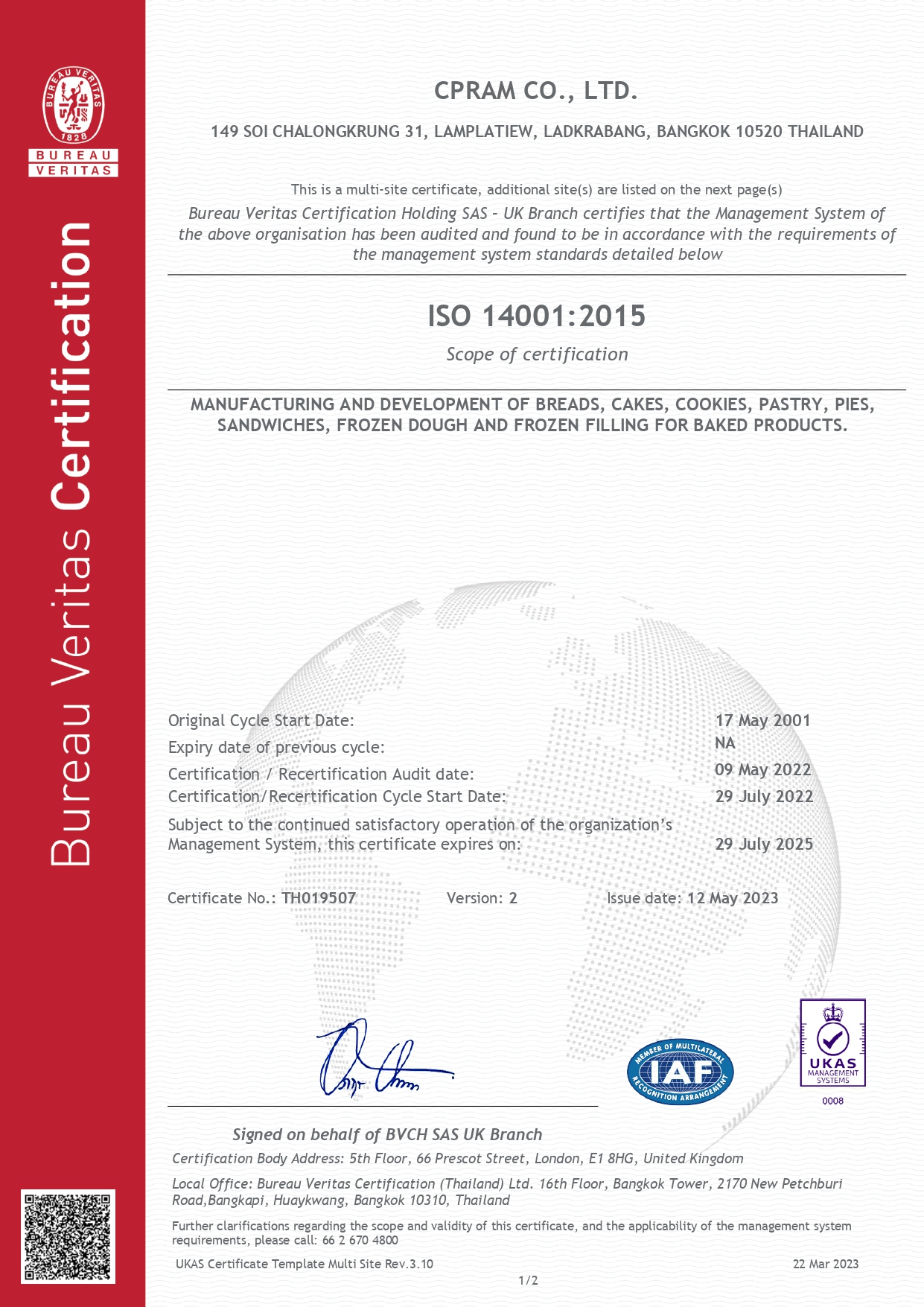
CPRAM ISO 14001 Certificate for Ladkrabang Factory
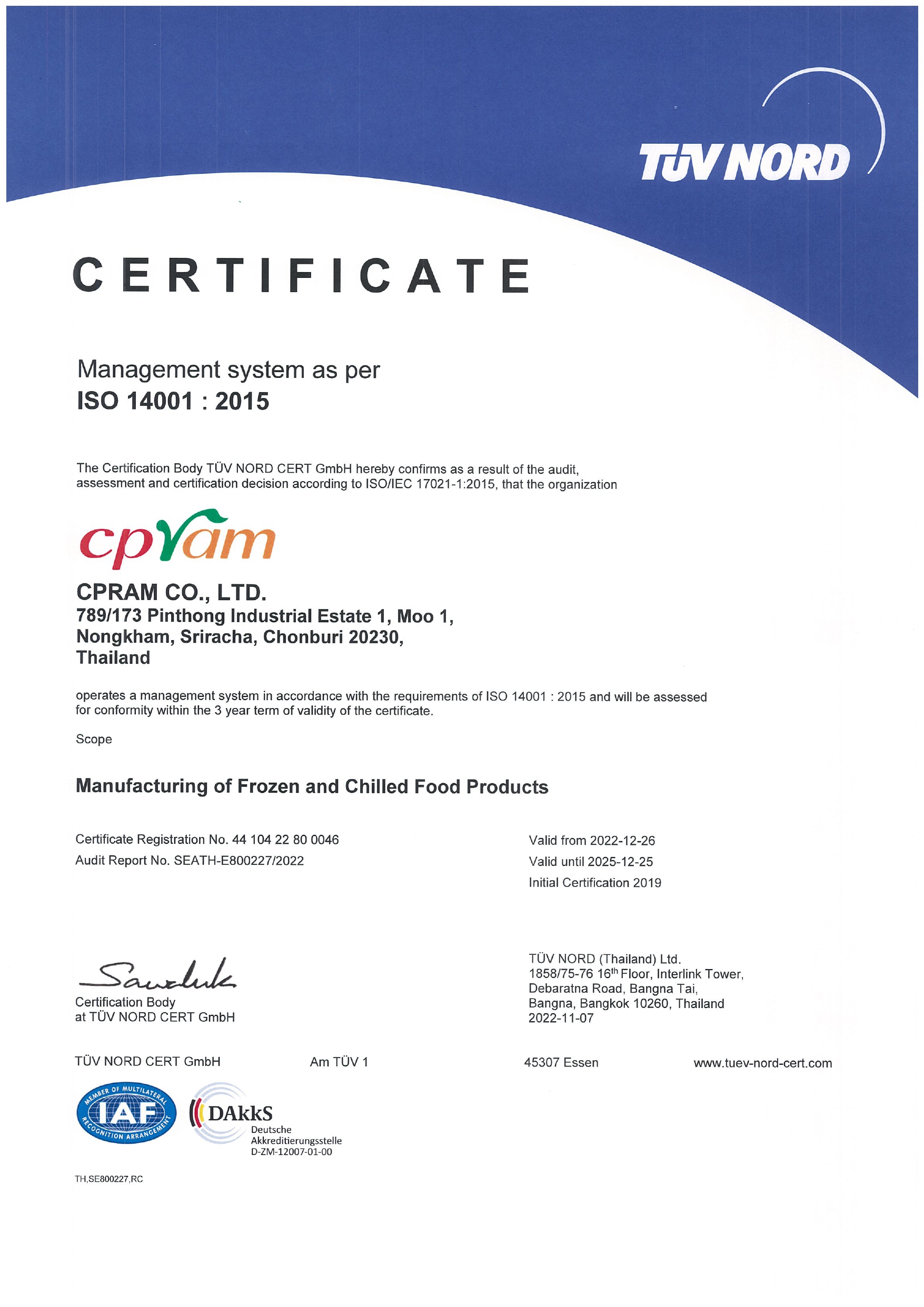
CPRAM ISO 14001 Certificate for Chonburi Factory
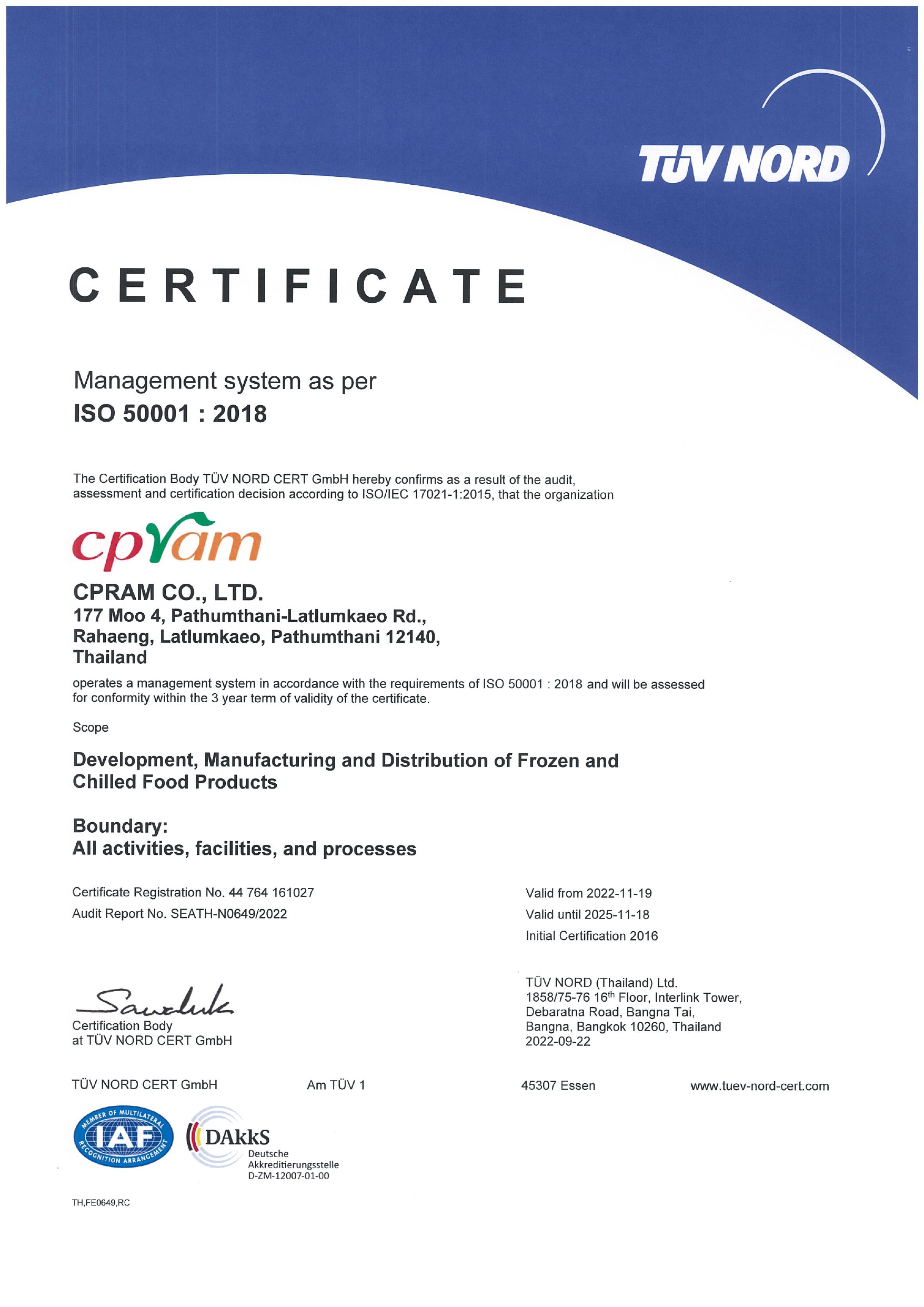
CPRAM ISO 15001 Certificate for Latlumkaeo Factory
2. Third party certification /audit / verification by specialized companies
In addition, the company is audited by an external auditor. (third party) or experts and prepare before conducting the actual audit. In 2023, the company was certified Green Industry certification and ECO Factory accounted for 29.86% as follows:
- Green Industry certification including Bang Buathong Distribution Center(CDC), Suvarnabhum Distribution Center(CDC) , Mahachai Distribution Center (CDC), Nakhon Ratchasima Regional Distribution Center (CDC), CPRAM Latlumkaeo, CPRAM Bo Ngern ,CPRAM Ladkrabang ,CPRAM Chonburi, CPRAM Surathani, CPRAM Khonkean, CPRAM Lamphun
- ECO Factory by the Department of Industrial Works including CPRAM Chonburi
Examples of Certification
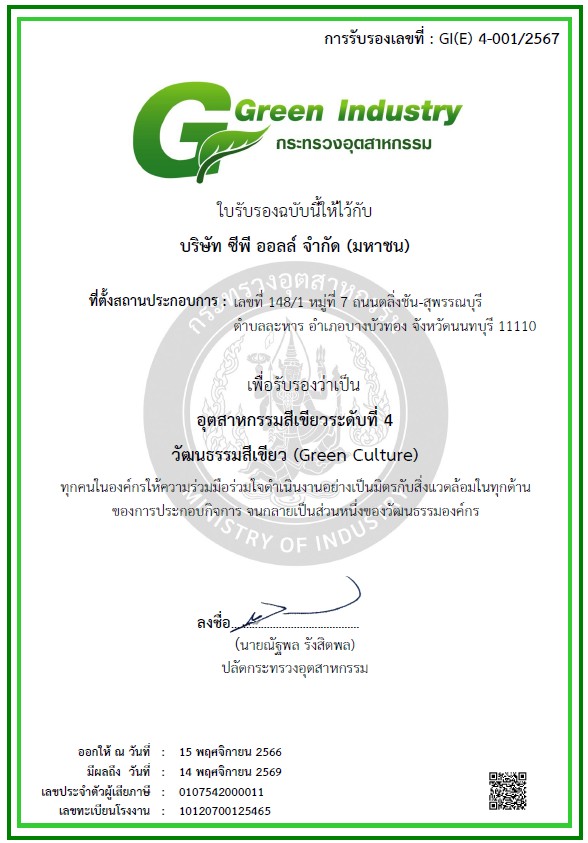
CPALL Green Industry Certificate for Bang Buathong (CDC)
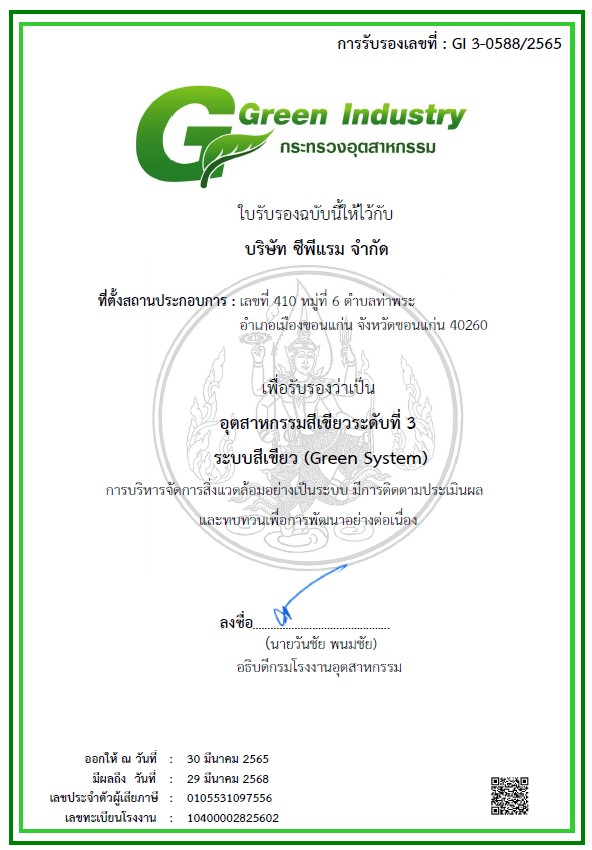
CPRAM Green Industry Certificate for Khonkean Factory
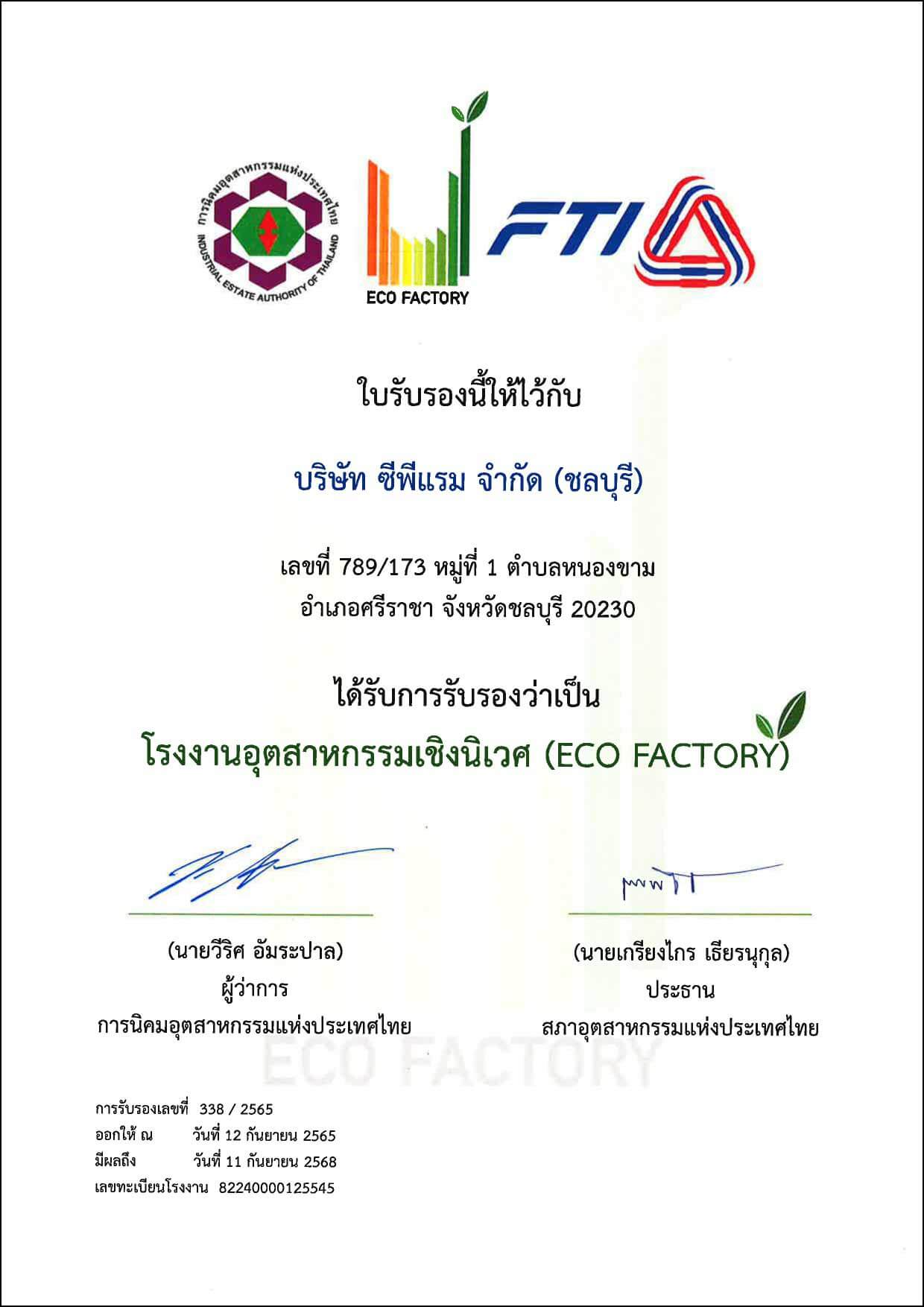
CPRAM Eco Factory Certificate for Chonburi Factory
3. Internal certification /audit / verification by company’s own specialists from headquarters
The company has instilled in employees at all levels an awareness of environmental management and good internal control. There is a self-audit process to protect the environment and ensure that all units comply with the principles of the Environmental Management System (EMS) according to the policies set by the company. operational guidelines, development plans, and project operations To assess Group SHE criteria and to be audited by an audit committee to assess the effectiveness of safety, health and environmental management.
In 2023, an internal audit was conducted. Marketing and distribution business group, all 55 units accounted for 32.55% , all 2 important environmental issues finding as follow:
